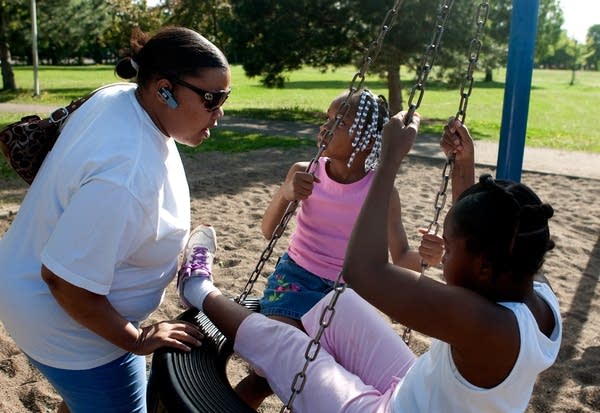Family's case challenges legality of non-compete contracts in mental health
Go Deeper.
Create an account or log in to save stories.
Like this?
Thanks for liking this story! We have added it to a list of your favorite stories.

Nadine Parker says that raising two children with severe mental health problems has not been easy, but in the past year things started to improve --until, she said, a piece of paper ruined everything.
For the past year, Parker's 8-year-old and 10-year-old daughters had been receiving services from a mental health worker who helped the girls learn how to adjust to school and reduce behaviors like bedwetting and self-injury. Parker said that after years of chaos and struggle, her children had finally found an adult they could trust.
But two months ago, the family's world was turned upside down when their mental health worker, Vanessa Slivken, changed employers. Slivken had signed a non-compete agreement with the agency she was leaving. As a result, she was not allowed to continue seeing any of her clients for one year.
Parker said the news left her angry and confused. The Minneapolis resident is considering bringing a lawsuit to challenge the agency's decision, arguing that the non-compete agreement caused serious and irreparable harm to her children.
Turn Up Your Support
MPR News helps you turn down the noise and build shared understanding. Turn up your support for this public resource and keep trusted journalism accessible to all.
"This is crazy as hell because her and my kids, they built this bond, and basically what [the agency is] trying to do is break it," Parker said. "That's how I feel."
A growing trend
Leading employment attorneys and mental health ethics experts say the conflict raises serious questions about a slowly growing trend of non-compete agreements in the mental health profession. They say Parker's fight could strike a legal blow to these agreements and might even result in legislative action to protect mental health consumers.
"I'd like to see a case like this go to the Supreme Court," said Alan Ingram, executive director of the Minnesota chapter of the National Association of Social Workers.
Ingram argues that the agreements unfairly limit consumer choice and often put the financial interests of the company above the needs of people with mental illness. The strength of the therapeutic relationship is often the most important ingredient in whether the client will make progress, he said.

But Parker faces an uphill battle. Under Minnesota law, non-compete agreements are usually legal, as long as they are designed to protect a legitimate business interest and have reasonable time and geographic limits. For most employers, that means limiting the agreements to less than two years and allowing former employees to break the agreement if they move to another state or region.
And while some states have imposed restrictions for the mental health profession, Minnesota has yet to take up the issue. The state only bans non-compete agreements for attorneys.
Many employers defend the agreements. They argue that non-compete contracts are necessary to prevent financial losses when an employee leaves an agency. Otherwise, they say, employees could take clients with them to a new employer.
"The fact is when you're working for someone else and being paid by someone else, those relationships belong to your employer," said William Pentelovitch, a Minneapolis-based attorney who represents Medtronic and other companies who use non-compete agreements.
But mental health ethics experts argue that non-compete agreements in their profession create unique problems. They point to the Parker family's situation as a particularly egregious example of the harm that can result from separating mental health providers from their clients.
"I have to say it's unprecedented in my experience, and I've been involved in thousands of cases around the country ... involving ethics disputes," said Frederic Reamer, a national expert on social work ethics and one of the chief authors of the code of ethics for the National Association of Social Workers.
Severed bond
Vanessa Slivken's relationship with the Parker family began in May 2009. She started working with Ra'Kia, 10, and Ja'Meka, 8, when she was employed as a mental health practitioner at Minnetonka-based Helena Family Support. At the time, Parker said, the two girls struggled constantly with their mental health problems.
Ja'Meka is affected by selective mutism, a condition where children who can speak well suddenly stop talking, particularly in school or social settings. Both children have trouble controlling their moods and behaviors and have a history of trauma and attachment issues.
"This practice is shocking, insensitive, and ... should be determined unethical and illegal."
Slivken declined to say whether she provided services to the family, citing client confidentiality, but said she usually saw clients twice a week -- both in their home and at school.
When the agency ended the support program last November, Slivken found a similar job at Twin Cities-based Complementary Support Services, she said. Parker transferred her daughters' care to the new agency and Slivken continued seeing the girls regularly.
Complementary Support Services required that Slivken sign a non-compete agreement, Slivken said. She said she hadn't received any training on the ethics of non-compete agreements in school and didn't consider the contract's potential impact on her clients.
Slivken said she now strongly regrets her decision to sign the agreement.
"I don't think non-competes belong in the mental health profession," she said. "In my opinion, ethically you should always have clients' best interests in mind. That should always be first and foremost."
The director of Complementary Support Services and the agency's attorney both declined to comment.
When Slivken left her job at Complementary Support Services in March, she asked the agency to grant her an exception to continue seeing the Parker family, but the company declined, according to another provider who works with the family.
Parker said her children were distraught. At the end of the family's final appointment, one of Parker's daughters frantically tried to get in Slivken's car.
"I had to tell her she couldn't go," Parker said. "From then, it's just been pretty much hell with the kids."
Parker said Complementary Support Services offered to provide another practitioner, but she rejected the offer in the hopes of being able to find a way to allow her daughters to continue with Slivken.
At the same time, Parker said her daughters' mental health declined sharply. Ja'Meka began picking at her skin constantly, a behavior she had almost eliminated while working with Slivken.
James Klund, a social services provider working with the family, noticed the impact on the children's mental health and filed a complaint with the state's Board of Social Work. Klund also connected Parker with a pro bono attorney.
"This practice is shocking, insensitive, and, it's my argument, should be determined unethical and illegal," Klund wrote in his complaint.
Louis Hoffman, the Board of Social Work's compliance director, said the board does not comment on pending complaints and that the agency does not have any specific policies regarding the ethics of non-compete agreements.
The legal question
While the board considers the complaint's merit, Parker's attorney, Ellen Sampson, has been weighing the family's legal options, but said there's likely little that can be done.
Experts in mental health ethics and employment law disagree, arguing that the family could bring a negligence claim against Complementary Support Services for the alleged harm inflicted on the children as a result of the non-compete agreement.
"When you're working for someone else ... those relationships belong to your employer."
"I think in the mental health field, there's going to be a pretty good chance the courts are going to be very, very hostile to this concept" of non-compete agreements, said Stephen Cooper, a Twin Cities-based employment attorney.
If Parker decides to sue, Cooper and other attorneys said the court would likely weigh the business interests of the employer against the interests of the public. The court could also consider whether the professional obligations of the mental health provider conflict with state law.
A judge could decide that the entire agreement is invalid or could make changes to the contract.
Mental health advocates said they hope the Parker family's situation will convince state legislators to take up the issue, regardless of any court decision.
Several states have already banned non-compete agreements for doctors, and Massachusetts passed a law two years ago extending that ban to social workers.
Advocates also said that the situation serves as a valuable lesson for mental health consumers. Many clients, they said, have no idea that their therapist, case manager or other provider would not be able to see them if the provider switched to a new agency.
"Realistically, the average client is not going to be thinking that far ahead," Reamer said. "It's usually, 'I'm depressed. I need help. Can you help me?' [Not] 'Oh, by the way, do you work in a place that has a non-compete?'"
Ed Eide, executive director of the Mental Health Association of Minnesota, said clients should ask whether an agency has a non-compete agreement before receiving services.
"This could happen to you," he said.




